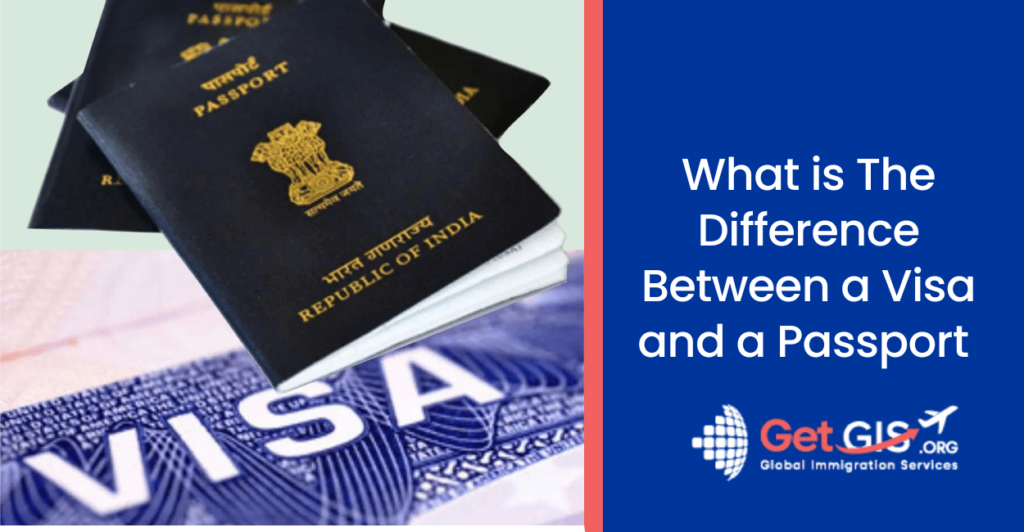The Difference Between Visa and International Passport
What is the difference between a visa and a passport when travelling from Nigeria? This is a common question many people have when preparing to go abroad. The passport and visa serve important but distinct functions in facilitating international travel.

A passport is issued by the Nigerian government to citizens as an international travel document verifying their identity and nationality.
On the other hand, a visa is official permission granted by the embassy or consulate of the country you intend to visit, allowing entry for specific purposes and time periods.
While both documents are important, understanding how they differ is helpful when navigating travel documentation as a Nigerian. This article will clearly outline the key differences in simple terms – from validity periods to issuing authorities and application procedures.
Furthermore, we will also provide an overview of the passport and visa application process in Nigeria.
WHAT IS AN INTERNATIONAL PASSPORT?
An international passport is an official government document that certifies the identity and nationality of the holder and facilitates international travel. It contains biographic information including your full name, date and place of birth, a unique passport number, issue and expiry dates, your signature and photograph.
A Nigerian passport allows the holder to travel internationally and serves as proof of Nigerian citizenship. It is issued by the Nigerian Immigration Service to eligible citizens who meet the passport requirements. There are different types of Nigerian passports including standard passports which are valid for 10 years and official or diplomatic passports.
If travelling from Nigeria, your passport should be valid for at least 6 months from the date you intend to leave the country in order to travel to most international destinations.
WHAT IS A VISA?
A visa is an official endorsement on a passport that indicates that the holder has met the requirements to enter the country that issued it. Visas specify the length and conditions of stay within the issuing country such as the dates of validity and number of permitted entries.
Unlike a passport which certifies nationality, a visa provides temporary permission to enter, stay within, or exit the country that issued it to the passport holder.
So in simple terms, your passport allows you to travel abroad while a visa allows you to legally enter a foreign country you are travelling to.
KEY DIFFERENCES BETWEEN AN INTERNATIONAL PASSPORT AND A VISA
There are some clear distinctions between these two travel documents:
- Issuing Authority: Passports are issued by the government of the holder’s home country. Visas are issued by the immigration authorities/embassies of the destination country.
- Nationality vs Entry Permission: The passport proves your nationality while a visa grants you permission to enter and stay in a foreign country.
- Validity Periods: Passports usually have longer validity running up to 5 or 10 years. Visas generally have shorter validity periods ranging from weeks to a few years depending on the visa type.
- Visa Specifies Conditions of Stay: Visas indicate details such as permissible length and purpose of stay that the holder must comply with. Passports do not specify travel conditions.
- Not All Countries Require Visas: You need a passport to travel internationally but visas are not mandatory to enter some countries. However, Nigeria requires its citizens get a visa before travelling to many destinations .
In summary, your Nigerian passport is necessary for identification while travelling abroad. It must remain valid for a stipulated period set by the destination.
Visas are additional approvals required by some countries to gain entry and stay for specific purposes and time frames.
Both documents are usually mandatory when travelling overseas from Nigeria.
HOW TO APPLY FOR A VISA IN NIGERIA (2026)
Looking to travel soon? If you’re a Nigerian passport holders travelling from Nigeria, the visa application process to enter another country are highlighted below:
- The first step to take is to identify the correct visa type. You must apply for the appropriate visa class based on your travel purpose e.g tourism, study, business, transit.
- The next thing to do is to check eligibility. Each country has specific eligibility requirements regarding financial means, invitation letters etc that you must meet depending on the visa category applied for.
- Prepare the required documents. This will be signed passport, duly filled application forms, passport photographs, bank statements etc in most cases.
- Submit online or offline application
- Attend interview if necessary: Some tourist, student or work visa applications need an interview at the embassy.
- Then, pay the required visa & processing fees which will be after submitting the complete application.
- If approved after processing, the passport containing the visa sticker or stamp will be ready for collection at the embassy or via courier.
All done!
The following paragraph will show you how to apply for a Nigerian International Passport.
HOW TO APPLY FOR AN INTERNATIONAL PASSPORT IN NIGERIA (2026)
Now let’s get to know about the international passport application process. To obtain an international passport in Nigeria, you will have to undergo the following key steps:
- First visit the Nigeria Immigration Service portal to download the passport application form, make payments and book an appointment at your chosen processing centre.
- Note that you must provide supporting documents like original birth certificate, previous passport, national ID card or documents to confirm citizenship.
- The third step will be to provide biometrics: Fingerprints, photographs and signature will be obtained as part of your passport application to validate identity.
- Then, attend capture and interview on the scheduled date and location.
- Moreover, certain documents like utility bills, national driver’s license, or others may be required to vet the application and confirm eligibility.
- After completing processing formalities, specified payments for booklets, production etc. Based on passport type must be paid.
If approved, applicants collect the new international passport in person or via courier from the Passport Office within 2 to 3 weeks after successful processing.
That’s it!
CONCLUSION
In summary, the key thing to remember is that your Nigerian passport proves your citizenship and allows you to exit the country while visas give approved entry and stay in your destination nation for particular reasons and durations. Passports have longer validity periods whereas visas are shorter term depending on the type.
Understanding what information goes on each document, their issuing authorities, eligibility criteria and application processes reduces confusion Nigerians often face when preparing international trips.

